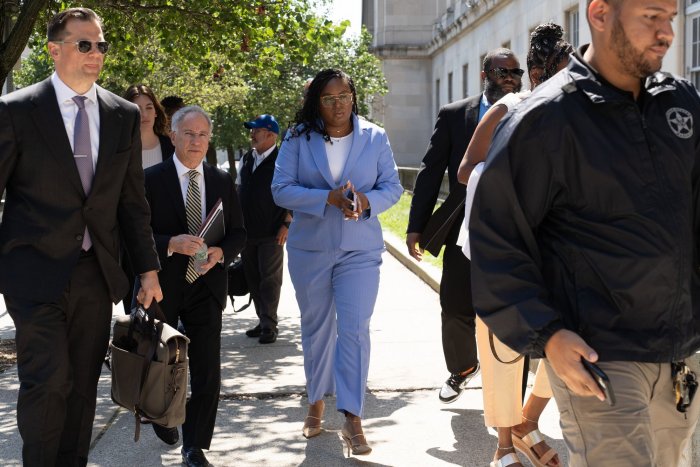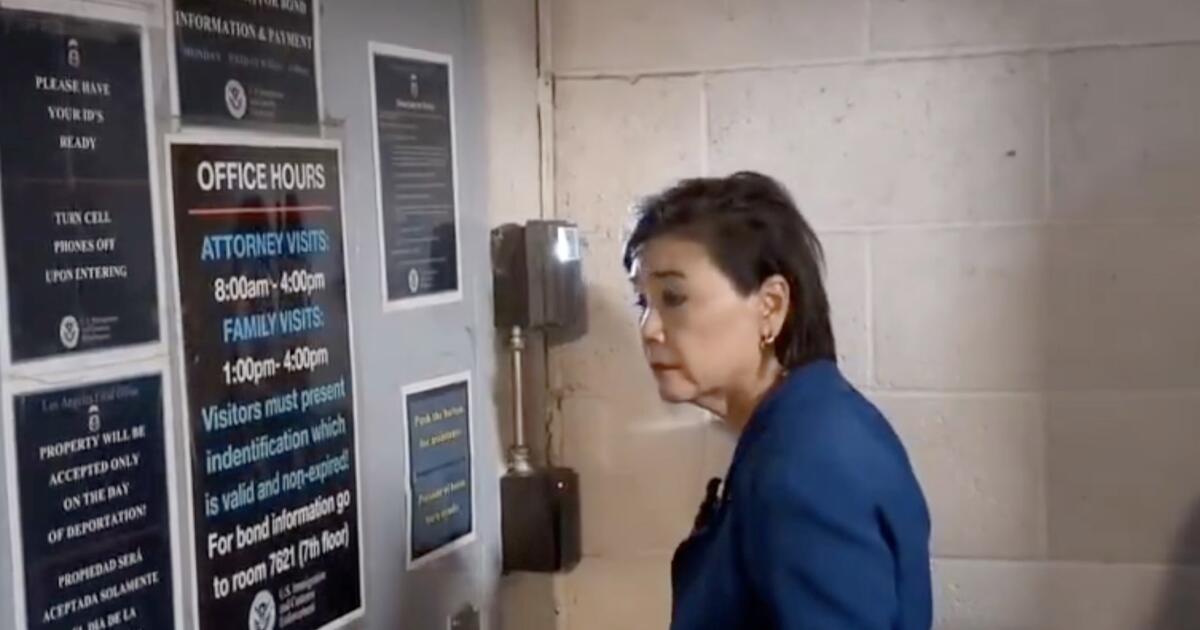Rep. Judy Chu first went inside the immigrant detention center in Adelanto in 2014, and conditions were bad.
When she made it back inside the privately run facility in the Mojave desert last week, things weren’t much better.
“It is just scandalous as to how it has not improved,” she told me.
Truth be told, conditions are likely to get worse, if only because of sheer numbers and chaos. Which makes it all the more important to have elected leaders like Chu willing to put themselves on the front lines to give a voice to the truly, really voiceless.
As tens of thousands of immigrants are chased down and incarcerated across the United States, oversight of their detention has become both increasingly difficult and important.
Shortly after the unannounced visit to Adelanto by Chu and four other members of Congress a few days ago, ICE announced new rules attempting to further limit access by lawmakers to its facilities — despite clear federal law allowing them unannounced entrance to such lockups. While Chu and others have called these new curbs on access illegal, they are still likely to be enforced until and unless courts rule otherwise.
The narrow, fragile line of the judicial branch is holding, for now.
But families and even lawyers are struggling to keep track of those who vanish into these facilities, many of which — including Adelanto — are operated by private, for-profit companies raking in millions of dollars from the government.
GEO Group, the publicly traded company that runs Adelanto, has reported more than $600 million in revenue so far this year and projects $31 million in additional annualized revenue from Adelanto at full capacity. Maybe DOGE wants to look into the fact that GEO often gets paid a “guaranteed minimum,” according to a report by the California Department of Justice — regardless of how many detainees are in a facility. Sounds like waste.
When the Trump administration started its attack on Los Angeles a few weeks ago, Chu started receiving calls from her constituents asking for help. She represents Altadena, Pasadena and other areas where there are large populations of immigrants, and as the daughter of an immigrant, she relates.
Her mom came here from China as a 19-year-old bride. Chu’s dad was born in the United States.
“I feel such a heavy responsibility to change things for them, to change things for the better,” she said. “I am surrounded by immigrants every day. This is a district of immigrants. My relatives are immigrants. My friends are immigrants. Yes, my life is immigrants.”
A few days ago, she tried to visit the Metropolitan Detention Center in downtown Los Angeles, where many of the recent protests have been focused, and where many of the people detained in Los Angeles have reportedly been held at first. She’d heard that even though it’s not meant to be more than a stopover, folks have been staying there longer.
“The fact that these raids are so severe, so massive, it just seems very obvious to me that they would not be treating the detainees in a humane way. And that’s what I wanted to find out,” she told me.
But no luck. Authorities turned her away at the door.
So a few days later she decided to show up unannounced — which is her right as a federal lawmaker — at Adelanto.
Guess what: No luck.
Officers there chained the gate shut, she said, and wouldn’t even talk to her.
“To actually just be locked out like that was unbelievable,” she said. “We shouted that we were members of Congress. We held signs up saying that we were members of Congress, and in fact, there was a car parked only a few feet away inside the facility. The job of that person was just to watch us. Wow.”
Wow indeed.
Undeterred, she came back a few days later when the gate was unlocked. This time, she drove straight inside, not asking permission.
Her staff “deliberately dropped me off inside the lobby before they knew that we were there,” she said.
She got out at the front door and was granted entry.
“The ICE agent said, ‘Oh, well, we thought you were protesters the time before,’” she said. “And that cannot be true, you know, considering all of our yelling and signs. But anyway.”
She was armed with the names of people from her district who had been detained, and she asked to see them. She got to speak to some of them, but everyone wanted her help. At the start of the year, Adelanto held only a handful of people, having been nearly closed by a court order during COVID-19. Now it holds about 1,100, and can take up to about 1,900.
“These detainees were jumping up and down trying to get our attention,” she said. What they told her was disturbing, and casually cruel. No ability to change clothes for 10 days. Filthy showers. No access to telephones because they need a PIN number and no matter how many times they request one, it never seems to materialize. No idea how long they would be held, or what would happen next.
“It could be weeks,” she said. “It could be years.”
Vanished.
“It is horrendous,” she said. “And it is ripping our communities apart,”
Indeed it is, especially in Southern California, where immigrants — documented and not — are entwined in the fabric of our lives and our communities.
Which is why people like Chu are so vital to what happens next. Not enough of our lawmakers have spoken up, much less taken action, against the erosion of civil rights and legal norms currently underway. Chu has spent a decade trying to bring accountability to immigration detention and knows this sordid industry better than any. It’s work that many never notice but that matters to the families whose loved ones are scooped up and disappeared into a system that, even in its best days, is convoluted.
“These are not the criminals and rapists that Trump promised he would get rid of,” Chu said. “These are hard-working people who are trying to make a living and doing their best to support their families. These are your friends and neighbors, and as we’ve seen, U.S. citizens have also been arrested. So next it could be you.”
Or her. Other lawmakers have been arrested and charged for attempting to enter detention centers on the East Coast, and Sen. Alex Padilla was knocked over and handcuffed recently for interrupting a news conference by Homeland Security Secretary Kristi Noem.
We are in the era when questions are often met with mockery or silence — or even violence — from authorities, and everyday champions are vital. Propaganda and lies have become the norms, and few have the ability to bear witness to truth inside places of state power such as detention centers.
So it’s also an era when having people who will stand up in the face of increasing fear and chaos is the difference between being vanished for who-knows-how-long and being found.
Even if it’s inside Adelanto.


